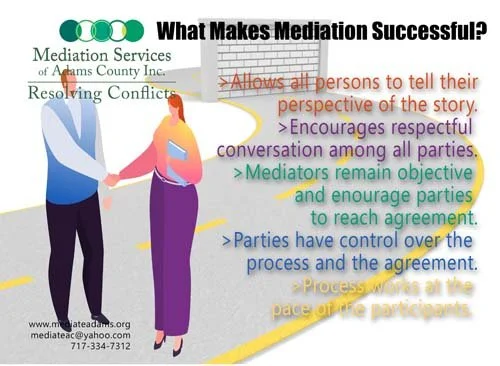What to expect at a Mediation Services of Adams County Inc.
What to expect at a Mediation Services of Adams County Inc.
What is Transformative Mediation?
Transformative mediation is a powerful approach to resolving conflicts that focuses on empowering individuals and fostering mutual understanding. Unlike traditional mediation, which often emphasizes settlement, transformative mediation helps parties regain a sense of control and clarify their perspectives, enabling them to better engage with one another.
In this process, mediators guide conversations without dictating outcomes, creating a safe space for participants to express their feelings and concerns. By shifting the focus from winning arguments to improving communication, transformative mediation builds stronger relationships and promotes lasting solutions.
Whether addressing workplace disputes, community disagreements, or family conflicts, this approach has proven effective in fostering respect and collaboration. Transformative mediation not only resolves issues—it helps people grow.
What do mediators do?
How do I get a mediation?
As a party to a conflict, you may call the Help Line 717-334-7312 and leave a message for MSAC’s Intake Coordinator (IC).
The IC will call you back to briefly describe the mediation process, learn more about the conflict, obtain the name and contact information of the other party.
The IC will contact the other party to explain the mediation process and determine whether he/she is willing to negotiate.
The IC will contact qualified mediators to work with you, assuring that there is no conflict of interest or personal relationship between mediators and disputants.
The mediator(s) will contact both parties concerning the time and the location of the mediation.
The mediator(s) will meet you at the appointed place at the scheduled time and explain the mediation process. All participants will be emailed a “Consent to Mediate” form and asked to sign it online. Our payment information is included in the above email and is expected at the session.
Each party will be asked to tell his/her side of the story. The mediator(s) may ask questions to clarify or encourage you to present your issues, as well as your needs and interests.
The mediator(s) will help you better understand what may be driving the conflict by listening, reflecting and checking in with questions about how the process is going.
A mediation does not need to come to a solution or an agreement of any kind. If an agreement is required the mediator can write that for you and submit it for your approval, either at the mediation or through email. Some agreements will need to be notarized for the courts, you can do that on your own. We are not notaries.
The agreement and case description will be filed. Any notes or other statements taken down during the mediation will be destroyed.


